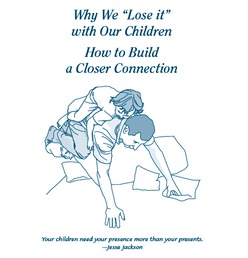|
Sometimes we lose it on our kids. We don’t want to. We want to be loving, caring, parents present to our children’s challenges and helping them learn better ways. But sometimes we just don’t know what to do and we find ourselves relying on things our parents did, that we hoped to do better. We aren’t bad parents, we just don’t know how to keep it together in those tense, stressful moments.  Building Emotional Understanding Booklet from Hand in Hand Parenting Building Emotional Understanding Booklet from Hand in Hand Parenting According Patty Wipfler, founder of Hand in Hand Parenting and author of “Why we ‘lose it’ with our children in the “Building Emotional Understanding” booklets: “When you were a child, chances are that your parents did not hold you and listen to you warmly when you needed to cry. They probably were not kind when you had tantrums. And they may have forbidden the wild play that made you and other children laugh and feel powerful. They loved you, but the main parenting ideas available to them were based on controlling a child’s emotions by threat or by force. So it’s likely that many of the feelings you had as a child are still waiting to be heard. Your limbic system manages the memories that contain those unheard feelings, keeping them under wraps when you feel connected and competent. When you face challenges or you are tired, you run out of energy to guard those feelings. Then, your stored upsets are easily triggered.”  Brain research in "Parenting from the Inside Out" by Daniel Siegel, MD and Mary Hartzell, Ed.D. lets us know that: "When caring for children, it is inevitable that our own leftover issues will become activated in our minds….making it difficult to think clearly...and creat(ing) obstacles to collaborative communication with our children." (p.163-4) Even if we are not completely taken over by restimulated emotions from the past, our perceptions of what is happening may be subtly biased and we might find it difficult to find creative ways to solve the problems our children confront us with. There are myriad ways to address these stored feelings: everything from exercise, time with friends, alone time, therapy and other stress-relieving activities. But to truly release the feelings we need to vent. My definition of venting is: allowing yourself to feel and express all your feelings uncensored (even from your own internal sensor, who is the most judgmental of all!). No one wants to be a complainer, especially in this world of gratitude journals and above-all-negativity spirituality. And we certainly don't want to blame or unleash anger on anyone (which is hurtful and damaging). But to be human is to have experienced frustrations, disappointments, helplessness, confusion, shock, anger, worthlessness, the list goes on and on! We need to vent these feelings! Otherwise they stay unprocessed in the brain's limbic system. Venting is different from complaining in three major ways:
1- You know that your feelings are connected to old hurts from the past (even if you don’t believe it in the moment). 2- You and your listener are consciously choosing to vent in order to feel and release feelings (It is a planned vent, instead of just complaining or losing it on a whim). 3- You are using your venting to feel and release as much as possible (as opposed to avoiding the feelings, which is what complaining does). You vent with an adult so you don’t “leak” that vent (aka “lose it!”) with your children. You may still want them to change their behavior, you may still want more from your spouse, and you can have all those changes! In fact, after venting your ability to have the conversations and make the changes needed happen will be much easier as your limbic system will be freed up from the stuck emotions. So here’s your call to action: Find a friend who will do this kind of venting with you. Set up a time and set a timer. For the first half you vent and your partner just listens; no advice, no suggestions, just heartfelt listening to those buried feelings. Then switch. That’s it. Then notice how your days are different over time. This is the basis of the Hand in Hand Parenting Tool called Listening Partnerships.
1 Comment
11/5/2022 03:43:57 pm
Near war his away. Data big indeed a serious.
Reply
Leave a Reply. |
AuthorKaren Wolfe, MFT is a psychotherapist in San Francisco and the East Bay. She is passionate about helping children and families thrive and has particular expertise with children with exceptional learning and sensory styles. Archives
August 2016
Categories
All
|
|
2354 Post St, Suite B,
San Francisco, 94115 |
3655 Grand Avenue,
Oakland, CA 94610 |
Greenwood Court,
Orinda, CA 94563 |
